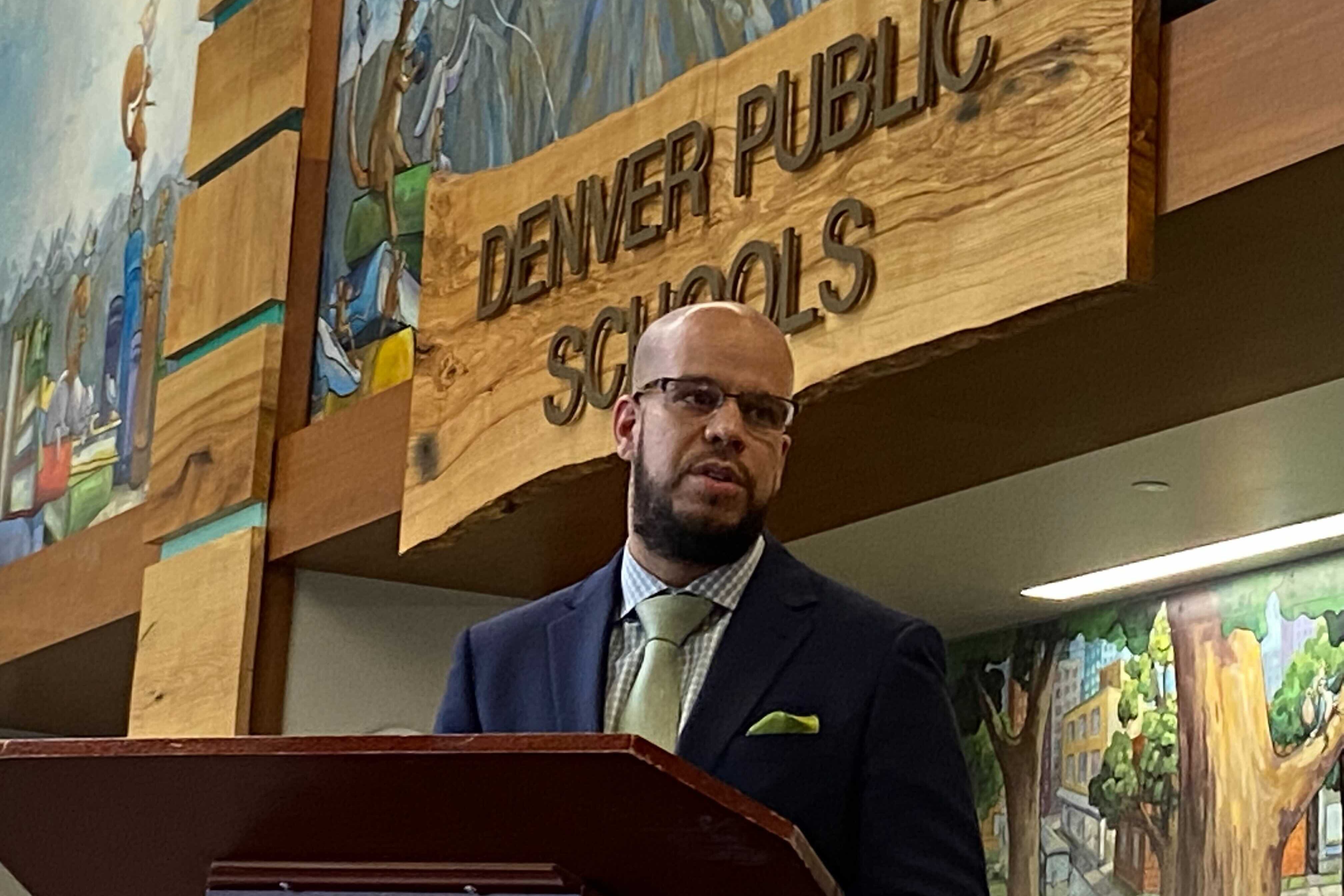Sign up for Chalkbeat Colorado’s free daily newsletter to get the latest reporting from us, plus curated news from other Colorado outlets, delivered to your inbox.
Revising Denver Public Schools’ discipline code, screening all young students for dyslexia, and increasing the percentage of students reading and doing math at grade level are among the Denver superintendent’s goals for this school year.
At a Denver school board meeting last week — the first voting meeting since three new members were elected — the board approved a long list of metrics by which to evaluate Superintendent Alex Marrero. The metrics are officially known as “reasonable interpretations.” They are Marrero’s take on how the board, which hired him in 2021 and oversees his work, will know if he’s accomplishing the overarching goals the board has set for DPS.
The vote to approve the metrics was split, with the three newly elected board members voting no and the four veteran members voting yes, revealing a potentially new divide on a board that has been known for its divisiveness.
The tone of the hourlong debate last Thursday was polite, if impatient at times. The three new board members, who were sworn in Dec. 1, said they hadn’t had enough time to review the more than 230 metrics since they’d gotten the documents two days before.
“It is a lot to go through, to evaluate, to research as a very brand-new, 13-days-in board member,” said new member Marlene De La Rosa.
The four other board members said they sympathized. But they said the board had already delayed the vote so the new members could weigh in, and that delaying it any further would cause, as member Scott Esserman put it, “stress and uncertainty.”
“It’s really important that we take care of this and move on,” Esserman said.
An attempt by the new board members to delay a vote on all of the metrics until January failed 4-3. So did a separate attempt to delay voting on a select number of high-profile metrics related to school safety, student discipline, and academic curriculum.
The metrics are tied to Marrero’s performance evaluation, which happens each October. Last school year, Marrero met 80% of the metrics, earning him a $8,235 bonus, which was equal to 2.5% of his salary. Under his contract, the more metrics he meets, the higher the bonus.
This school year’s metrics range from hyper-specific — that the district’s new greenhouse will harvest 8,160 pounds of tomatoes by June — to more broad, including that Marrero will “guard against the … endangerment of the district’s public image or credibility.”
Other metrics specify that Marrero will:
- Publish a revised “discipline matrix” by the end of this school year. The discipline matrix dictates when educators can suspend or expel a student or refer a student to police. It came under intense scrutiny after a previously expelled student brought a gun to Denver’s East High School in March and shot two deans before taking his own life.
- Ensure all police officers stationed inside DPS high schools are certified by the National Association of School Resource Officers and ensure school leaders with a new officer in their building attend a training put on by the same organization. The board voted to return police officers to some DPS high schools after the East High shooting.
- Ensure that school resource officers who don’t follow district policy, don’t comply with the discipline matrix, or don’t abide by best practices are “promptly removed.”
- Monitor tickets and arrests by school resource officers and ensure that students are not ticketed for “low-level violations” of the city municipal code.
- Increase by at least one percentage point the share of students who score at grade level on state literacy and math tests, both overall and for specific student groups, including Black and Latino students, students with disabilities, and students who qualify for subsidized meals.
- Ensure all students in kindergarten through third grade take a universal reading screener to help detect reading problems such as dyslexia.
- Increase high school graduation rates, the reporting for which lags a year behind. The graduation rate for the class of 2022 was 76.5%. The goal for the class of 2023 is 79%.
- Improve student attendance. The district fell short of its attendance goals last year.
Melanie Asmar is the bureau chief for Chalkbeat Colorado. Contact Melanie at masmar@chalkbeat.org.






